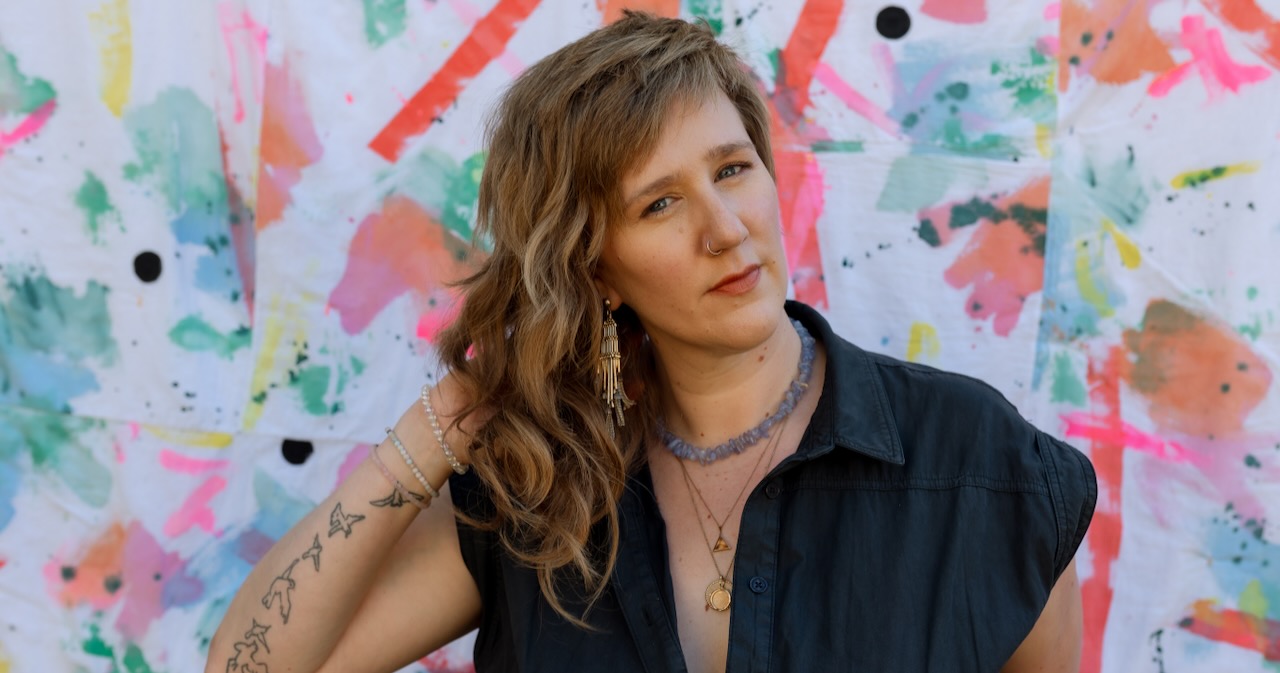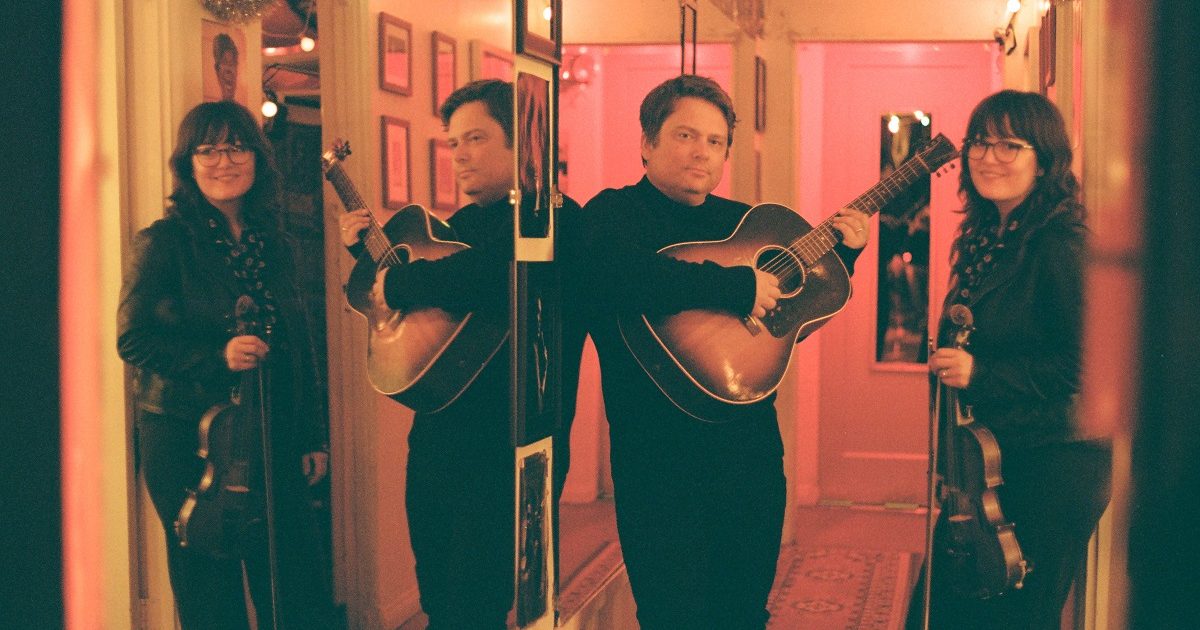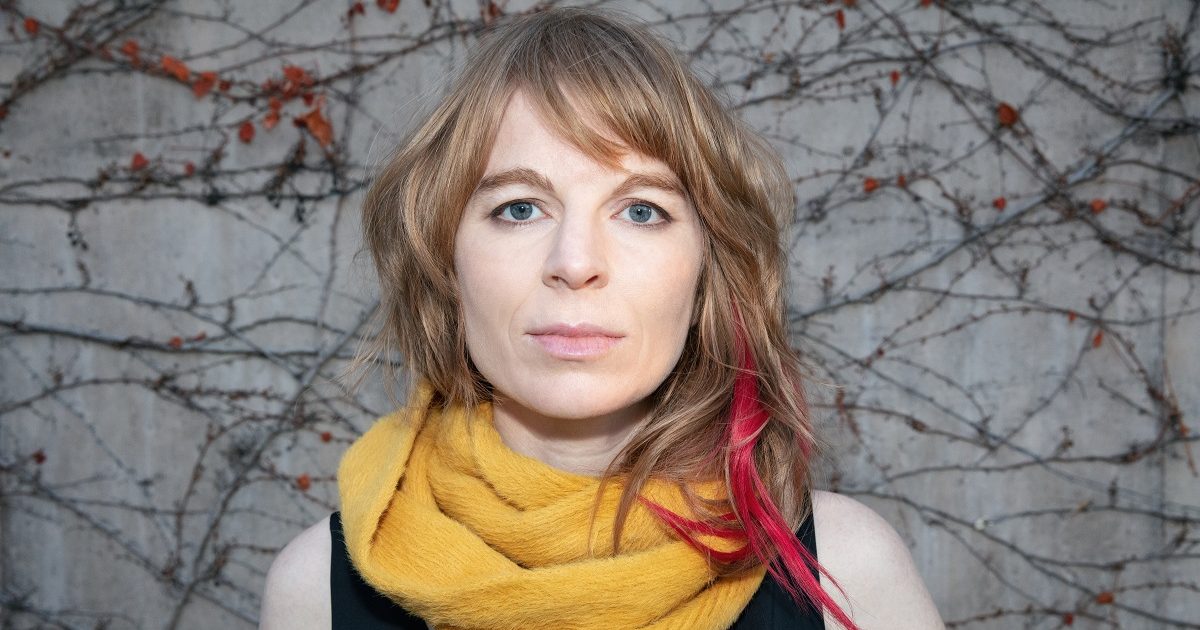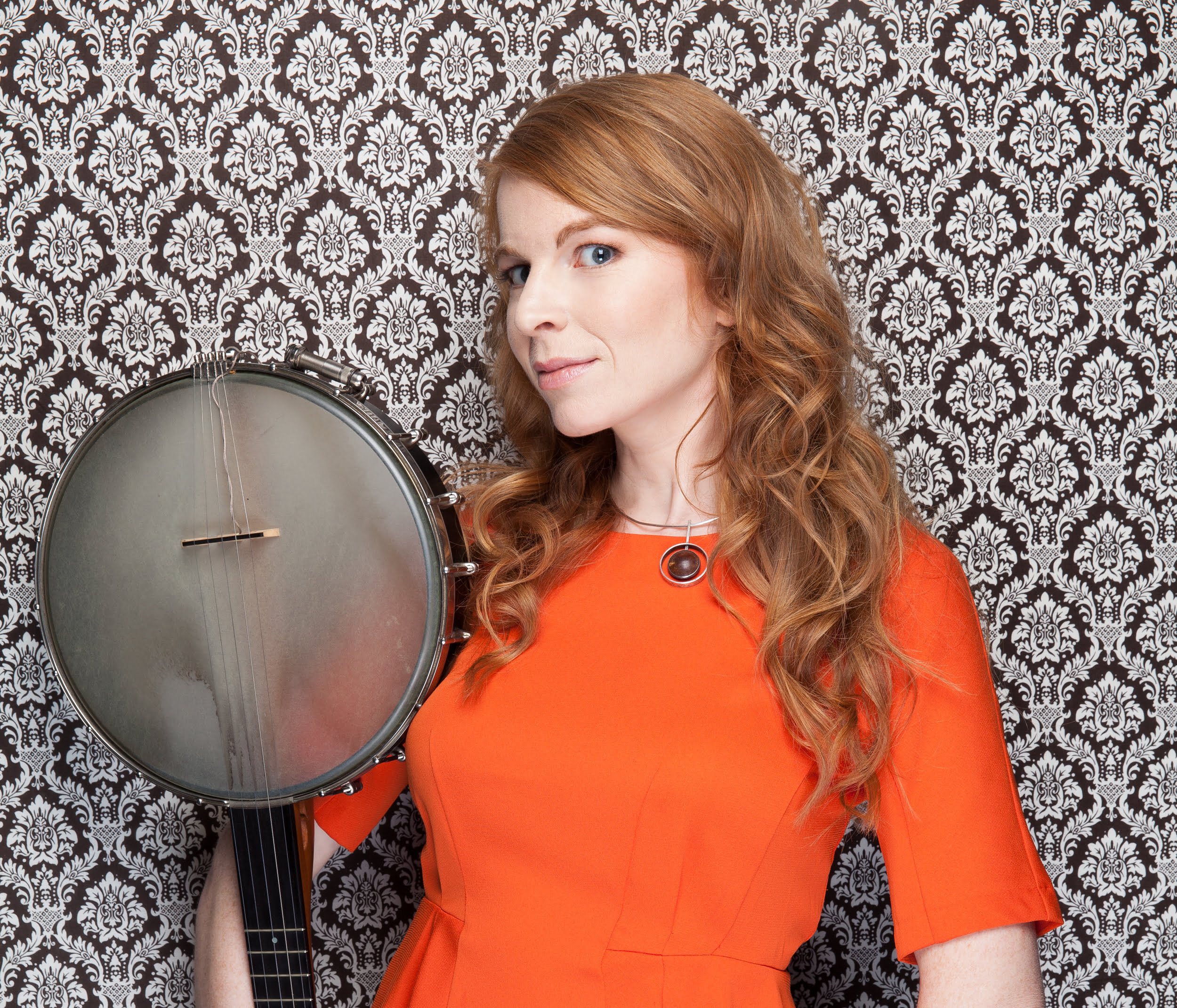There’s a video on YouTube of Moira Smiley leading a gathering of more than a thousand high schoolers in her voice-and-body-percussion arrangement of blues great Lead Belly’s “Bring Me Little Water, Silvy.” “Sing with our outside voices!” she exhorts them. No matter where she is, she’s all about singing out, using her voice, encouraging others to use their voices, to sing out loud.
Smiley definitely uses her outside voice, and a few other voices, on her new album, Unzip the Horizon. It’s a bracingly wide-ranging set of original songs drawing on everything from her experience in chorale work to explorations of Eastern European folk music to her time as a touring singer and percussionist with boisterous pop experimentalists Tune-Yards. Tying it all together are with two traditional American songs from the repertoire of blues singer Sidney Hemphill Carter, as recorded in 1959 by folklorist Alan Lomax.
She also enlisted an impressive roster of other voices for Unzip: Leah and Chloe Smith from Rising Appalachia, English neo-traditionalist Sam Lee, folk-and-more duo Anna & Elizabeth, Seamus Egan of the Irish-American band Solas, banjo innovator Jayme Stone, and participants from the Calais Sessions — a recording project with international musicians working with refugees, many of them unaccompanied children, living in hardship of the Calais “jungle,” a makeshift encampment in France.
And then there’s Tune-Yards’ life-force, Merrill Garbus, partnering on the rhythm-forward “Bellow,” which serves somewhat as the album’s mission statement: Please don’t give up. Please don’t hide your voice. So many people did not have that choice.
Smiley has lived by those words, taking seemingly every opportunity to explore musical and cultural avenues. In addition to her work with Tune-Yards, Solas, Stone, and the Los Angeles Master Chorale, she’s been featured on jazz pianist Billy Childs’ acclaimed tribute to Laura Nyro; studied and sung music ranging from the compositions of 12th-century abbess Hildegard Von Bingen to 20th-century sonic revolutionary Karlheinz Stockhausen; and sought and shared songs and sounds in such spots as a rural Ireland, rural Appalachia, and refugee camps in Europe, where she has volunteered with the humanitarian organization Expressive Arts Refuge.
And for more than a decade, women’s ensemble Moira Smiley & VOCO has mixed scintillating vocal harmonies with innovative use of various acoustic instruments and body percussion, their 2014 album, Laughter Out of Tears, diving into songs from Scandinavia, the Balkans, and Appalachia, along with originals inspired by those traditions, a Robert Johnson tune, and a moving version of Woody Guthrie’s ever-poignant “Deportees.”
All of that is artfully integrated into Unzip the Horizon, the work of a significant talent finding new possibilities in her voice, literally and literarily. Or as she and Garbus sing on “Bellow”: You ask me why I sing softer now. Did the world beat me down? This is the way we call the unknown, lift the veil to the other side.
There’s a word that’s in the lyrics of at least four songs on this album: broken. Do you see singing, music as a way to repair breaks in the world?
First of all, I love the word “broken.” And I love the idea of it because, from decay and brokenness, always come the new things. But also it’s that reminding ourselves to look around and see all the ways we’re broken. We’re often pushing forward, trying to ignore what’s broken. I’m interested in the compassion of noticing the broken and, yeah, trying to heal it — and realizing that some of it we can never heal.
And music has a role in that?
I think so. Sometimes I think music is just child’s play and has no power. But when I look out at a group of kids that are moving together, singing, as I do with all this chorale stuff, and feel that pride and joy, that’s palpable. Music does have a way of lifting us up together. That’s obvious, right? I don’t know if it changes the world. I feel super-cynical about it, but also hopeful that I’m making a difference.
It’s about giving voice to people’s stories.
It’s true. There’s a lot of evidence in the traditional songs that you make a difference with the singing. Some of the Balkan songs, a lot of Bulgarian songs are about lamenting the role of a woman — that she’s powerless to say where she goes and who she loves. The songs express the powerlessness and, at the same time, acknowledge the roles of the woman and also empower her.
And music has been a force for overcoming oppression — the “Singing Revolution” in Estonia, the role the rediscovery of folk music helped restore national identity in Hungary and elsewhere as they broke from Soviet domination.
As a force against colonialism, it can be very powerful, and that’s across the board. I was just reading Maria Popova. She does Brain Pickings, every week sends out a collection, writes articles with tons of literary references, everything from Zadie Smith to Camus. She’s incredible. She was talking about how Zadie Smith speaks of “othering,” and the relationship of the “other” to us.
I just wrote another song that talks about anger and fear being in the same room and the polarization we see in our country — anger in the other side because you fear the other side because you don’t understand the other side, which creates a cycle.
What did Merrill Garbus draw from you in your Tune-Yards stint?
She drew on the whole spectrum of my voice and also my physicality, which I loved. I was dancing every night! The percussive aspect of her music got into my bones. The interest I had in body percussion, got to play around for a couple years with her and using the fullest voice was such a pleasure. We were singing at the top of our lungs and dancing, percussively, behind her.
Did you write songs on the album thinking about who would sing and play with you, or did you write first and invite guests after? For example, “Wise Man” sounds tailor-made for Sam Lee.
In that case, the song came first, but I really wanted Sam to sing with me on the album. The song came a while ago and when I was thinking of it — a love story, really — I wanted it as a duo with a man’s voice and thought he would be perfect. I adore Sam.
And “Dressed in Yellow” with Anna & Elizabeth?
I always knew I wanted to have them. I wrote “Dressed in Yellow” on the tour bus with Tune-Yards and always heard Anna & Elizabeth singing those responses. It was really shortly after the creation of the song that they came to mind.
The song sounds like a mix of American “shape note” singing and the playfulness of the kind of things June Tabor and Maddy Prior did with English folk songs in their Silly Sisters duets.
Oh, yeah, totally. It’s in the shape of a child ballad [from England], like “The Devil’s Nine Questions.” [She sings some of it] It’s kind of that ballad form, with the statements and responses, and I threw in a little bridge at the end.
And then Leah and Chloe Smith for Rising Appalachia along with the Calais Sessions performers on “Refugee?”
When I was singing “Refugee,” I forget how the time-line went, but [Leah and Chloe and I] were in touch. We’ve stayed in touch over the years, but were talking about getting together to do something, and that made me realize they’d be perfect, with their social consciousness right out front.
The other parts, with the Calais Sessions, they were doing really powerful, well-regarded work in the Calais Jungle, respected musicians. I had [Anglo-Nigerian percussionist] Sola Akingbola in a friend’s living room with a Kurdish percussionist, Rekan Ibrahimi. Sola is from the band Jamiroquai, and went to Calais to work with the Calais Sessions. That’s a really cool bunch of musicians and they released a beautiful album, too. Everything from Eritrean church songs to Kurdish folk.
You have worked with refugees, yourself, so the inspiration for the song is personal.
I’ve been for the last couple of years going with a group of Americans to teach music, bring medical supplies, volunteer at refugee camps in Europe. It’s called Expressive Arts Refuge. I was invited by Betsy Blakeslee, who has spearheaded this throughout the world. She also worked in the Bosnian war in the ‘90s. She’s interested in using the arts to help others.
When we were in the Calais Jungle, and then were in Athens last summer, there were a lot of Arabic-speaking people there. They also speak their own languages, but Arabic is spoken across cultures, and I came to realize what a vast and ancient music culture that is — and how modern it is. I recorded a lot of young Arab rappers, fully fledged hip-hop artists, but they were also playing ouds and sazzes and all mixed together. That was an eye-opener back into some of the early music work that I’ve done, music from Spain in the 1400s and what happened after that [the expulsion of the Arabic, Moorish and Jewish people]. So here we are again, in a different, but related era of diaspora. What can we learn from the past? How can we be compassionate to each other as these big forces are hurting us and our brothers and sisters?
Do you see yourself as a musicologist or folklorist?
Roughly. I have long worshipped that role, the ethnomusicologist, song collector, for sure. I’ve done it, but I wouldn’t call myself anything official.
But you’ve made a point of seeking out singers and songs all over the world, so you are doing that.
Sitting in a field with the Ethiopian musician Seleshe Damessae, that was one of the earliest mind-blowing experiences for me. Literally, sat in a field in the shade of this tree and he just said, “Okay, I’ll give you some songs.” That was years ago … could have been 18 years ago. Those experiences — in kitchens, at the end of a concert, at a party — that’s where the business is. That’s where the magic happens.
You have the two songs on this album that come from the Alan Lomax archives — “Worried Now,” which is a fairly well-known song, and “Leather Britches,” which is probably less familiar. You play around with both of them in your own distinctive ways.
That comes partially because of this long-time project with Jayme Stone, searching around the Alan Lomax collection. The global jukebox is what Alan named it, and you can look it up at culturalequity.org. Enormous resources. Those two songs are from stumbling around on there. She [Sidney Hemphill Carter] sang whatever she could remember, some blues. And Alan said, “Do you have any songs from when you were a kid?” That’s what came out.
There’s a fiddle tune called “Leather Britches.” When I first brought this song out, I performed it with body percussion and singing for a long time in concerts. It was kind of an outlier for this album, but it’s me playing around — prepared piano and putting weird stoppers on the banjo, more fun and experimental.
Photo credit: DeFurio Photography



